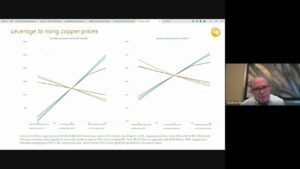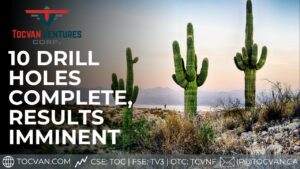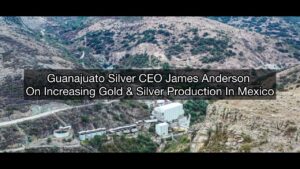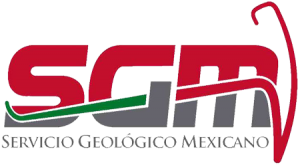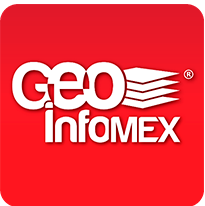Alamos Gold Inc. (TSX:AGI)(NYSE:AGI) (“Alamos” or the “Company”) today reported its financial results for the quarter ended March 31, 2013 and announced that it has filed with the Toronto Stock Exchange (the “TSX”) a Notice of Intention to make a Normal Course Issuer Bid (“NCIB”).
Production of 55,000 ounces in the first quarter of 2013 was the highest ever achieved by the Company in a first quarter and second highest in its history. Cash operating costs of $358 per ounce were significantly below annual guidance, contributing to strong operating margins and cash flow generation. Cash from operating activities before changes in non-cash working capital totaled $40.4 million ($0.32 per basic share) in the first quarter of 2013 and earnings were $26.0 million ($0.21 per basic share), which included approximately $0.05 per share of costs and foreign exchange losses associated with the Aurizon offer.
“The strong first quarter performance posted by Alamos, together with our announcement of the share buyback program, underscore management’s success in building an effective financial and operating platform to support profitable growth and value creation. By any measure, Alamos’ focus on continuous improvement, and its disciplined approach to growth and risk management, consistently produce first-quartile costs and margins, positioning the Company to outperform irrespective of the gold price environment. With nearly $490 million in cash and equity investments, no debt, and strong operating cash flow, Alamos plans to grow both organically and through acquisition,” said John A. McCluskey, President and Chief Executive Officer. “We believe that repurchasing shares from time to time, when they are trading at prices that in our view reflect a discount to their value, is advantageous to the Company and its shareholders. Purchasing shares for cancellation increases the value of the remaining shares and is consistent with our fundamental value creation strategy.
“With respect to Alamos’ growth plans, we expect that in 2013 we will obtain the approvals required to begin building Aðý Daðý and Kirazli, two self-funded mines in Turkey. As we have noted previously, the Kirazli Project is in the final stage of Environmental Impact Assessment (EIA) approval. In the next few weeks, we plan to submit our EIA for Aðý Daðý,” Mr. McCluskey added.
First Quarter 2013 Highlights
Financial Performance
- Sold 53,000 ounces of gold at an average realized price of $1,628 per ounce for quarterly revenues of $86.3 million
- Realized quarterly earnings of $26.0 million ($0.21 per basic share). Earnings for the period included a $3.6 million ($0.03 per basic share) foreign exchange loss on the Company’s equity investment in the shares of Aurizon Mines Ltd. (“Aurizon”), and $3.0 million ($0.02 per basic share) in transaction costs related to the Aurizon offer
- Generated cash from operating activities before changes in non-cash working capital of $40.4 million ($0.32 per basic share); after changes in non-cash working capital of $33.0 million ($0.26 per basic share)
- Increased cash and cash equivalents and short-term investments by $19.6 million to $373.3 million at March 31, 2013 ($489.1 million including equity investments)
- Declared a semi-annual dividend of $0.10 per common share. The dividend is payable on April 30, 2013 to shareholders of record as of the close of business on April 15, 2013
Operational Performance
- Produced 55,000 ounces of gold, a 36% increase from the first quarter of 2012
- Reported cash operating cost per ounce (exclusive of the 5% royalty) of $358 per ounce of gold sold, well below the Company’s annual cash operating cost guidance of $415 to $435. Total cash costs (including royalties) were $449 per ounce of gold sold
- Achieved average crusher throughput of 17,900 tonnes per day (“tpd”), above the Company’s annual guidance of 17,500 tpd for the second consecutive quarter
- All-in sustaining costs (which include total cash costs, exploration, corporate and administrative, share based compensation and sustaining capital costs) were $692 per ounce of gold sold. The Company anticipates all-in sustaining costs per ounce to be between $785 and $825 in 2013
- Announced an update on project permitting in Turkey, including substantial progress on Kirazlý EIA approval
- Replaced mineral reserves mined out at Mulatos in 2012, and increased measured and indicated resources by 10% in Turkey
- Withdrew the Company’s offer to acquire all of the common shares of Aurizon
Subsequent to quarter-end:
- Announced a share buyback program, pursuant to which the Company will offer to purchase for cancellation up to 10% of the public float of its outstanding common shares, or 11,373,316 shares over the next 12 months (limited to a maximum of 94,061 shares during any trading day)
First Quarter 2013 Financial Results
Strong operating margins from high realized gold prices and continued low cash costs contributed to the Company generating substantial cash provided by operating activities and earnings in the first quarter of 2013. Cash from operating activities before changes in non-cash working capital in the first quarter of 2013 of $40.4 million ($0.32 per basic share) decreased 10% relative to the same period of 2012.
Earnings before income taxes in the first quarter of 2013 were $38.8 million or $0.31 per basic share, compared to $39.5 million or $0.33 per basic share in the first quarter of 2012. On an after-tax basis, earnings in the first quarter of 2013 of $26.0 million or $0.21 per basic share decreased 12% over the comparable period of 2012 as a result of higher amortization attributed to mill production, costs incurred related to the Aurizon offer, and a higher effective tax rate, partially offset by a higher number of ounces sold during the period.
Capital expenditures in the first quarter of 2013 totalled $13.9 million. Sustaining capital spending in Mexico in the first quarter included operating and expansion capital of $4.1 million, consisting of $2.0 million for component changes on mobile equipment, $1.2 million for interlift liners on the leach pad, and $0.9 million invested in other smaller capital projects.
In addition, the Company invested $3.2 million in Mexico focused on continuing development of the El Salto portion of the Mulatos pit, pit design and stability work at Escondida and $1.5 million in capitalized exploration. The Company also invested $6.4 million in development projects in Turkey, focused on exploration, engineering and permitting work.
Key financial highlights for the first quarter of 2013 compared to the first quarter of 2012 are presented at the end of this release in Table 1. The unaudited interim consolidated statements of financial position, comprehensive income, and cash flows for the three months ended March 31, 2013 and 2012 are presented at the end of this release in Table 2.
First Quarter 2013 Operating Results
Gold production of 55,000 ounces in the first quarter of 2013 increased 36% compared to 40,500 ounces in the first quarter of 2012. Higher gold production in the first quarter of 2013 relative to the first quarter of 2012 was primarily attributable to higher crusher throughput. In addition, production in the first quarter of 2013 benefitted from a full quarter of production from the Escondida high-grade zone compared to a commissioning period in the first quarter of 2012.
Crusher throughput in the first quarter of 2013 averaged 17,900 tpd, 29% higher than 13,900 tpd in the same period last year and above the annual average budgeted rate of 17,500 tpd. This was the second consecutive quarter in which crusher throughput exceeded 17,500 tpd. During the first quarter of 2013, mill throughput met budgeted levels of 500 tpd.
The grade of the crushed ore stacked on the leach pad in the first quarter of 2013 of 1.25 g/t Au was higher than the full year budgeted grade of 0.98 g/t Au, and higher than the grade in the first quarter of 2012 of 1.17 g/t Au.
The grade of the Escondida high-grade zone mined and milled in the first quarter of 2013 was 6.59 g/t Au, below the Company’s full year budgeted average grade of 11 g/t Au. The bench mined during the quarter contained an area with highly silicified ore and weak fracturing, which had substantially lower grades than were modelled. Despite the shortfall in grade in the first quarter of 2013, the average grade of ore milled from the Escondida zone since the start of mining has averaged 11.27 g/t Au, which is consistent with the reserve grade. The Company expects to have completed mining the Escondida high-grade reserves at the end of 2013, at which point the Escondida Deep zone is expected to provide additional high-grade mill feed.
The reconciliation of mined blocks to the block model for the Global Mulatos Pit, including Escondida, for the quarter ended March 31, 2013 was +28%, -29% and -10% for tonnes, grade and ounces, respectively. During the first quarter of 2013, the Company encountered significantly more tonnes of ore, which had been modelled as waste in the block model, as the actual recoveries were better than reported in the model. The negative grade reconciliation was due to the lower grades encountered in the Escondida zone.
Since the start of mining activities in 2005, the project-to-date reconciliation is +3%, +5%, and +9% for tonnes, grade and ounces, respectively. Positive variances indicate that the Company is mining more gold than was indicated in the reserve model.
The recovery ratio in the first quarter of 2013 was 76%, in line with the Company’s budgeted average recovery ratio for the year of 75%.
Cash operating costs (exclusive of the 5% royalty) of $358 per ounce of gold sold in the first quarter of 2013 were significantly below the Company’s guidance of $415 to 435 per ounce. Cash operating costs were in line with costs in the first quarter of 2012, as higher input costs, including labour, cyanide and diesel, were offset by an improved recovery ratio. Including the 5% royalty, total cash costs were $449 per ounce of gold sold in the first quarter of 2013.
Key operational metrics and production statistics for the first quarter of 2013 compared to the same period of 2012 are presented in Table 3 at the end of this press release.
Share Buyback Program
The Board of Directors of Alamos has authorized the share buyback program because it believes that, at certain times, the purchase of shares may represent an appropriate use of Alamos’ available cash resources when, in the opinion of management, the value of the Company’s shares exceeds the trading price of such shares. Such purchases would provide additional liquidity to shareholders and may benefit the remaining shareholders by increasing the value of their equity interest in Alamos. Subject to acceptance by the TSX, the NCIB period will commence on April 29, 2013 and will conclude on the earlier of the date on which purchases under the bid have been completed and April 28, 2014. The NCIB permits the Company to purchase up to 10% of the public float in its shares, or 11,373,316 Shares. As at April 23, 2013 there were 127,487,786 shares issued and outstanding and the public float was 113,733,160 shares. Any purchases made under the NCIB will be effected through the facilities of the TSX, Alpha and/or alternate trading systems in Canada and will be made at the market price of the shares at the time of the purchase. Subject to any block purchases made in accordance with the rules of the TSX, Alamos may purchase up to 94,061 shares during any trading day, being 25% of its average daily trading volume of 376,244 shares for the six months ended March 31, 2013. The actual number of shares purchased, if any, and the timing of such purchases will be determined by Alamos considering market conditions, stock prices, its cash position, and other factors. There cannot be any assurances as to how many shares, if any, will ultimately be acquired by Alamos under the NCIB, and Alamos intends that any shares acquired pursuant to the NCIB will be cancelled. The Company has appointed Dundee Securities Ltd. as the broker firm responsible for making purchases of shares on behalf of the Company.
Turkey Developments
In December 2012, as part of the permitting process, the Company submitted an EIA Report on the Kirazli Project. The EIA Report is currently in the final stage of the approval process. While the approval will not be finalized until certain additional signatures are received from Turkish officials, the substantive aspects of the EIA review process have been successfully completed. The Ministry of the Environment, which is the government agency responsible for EIA approval, appointed representatives of government agencies and local authorities to a 17-person EIA Commission that reviewed the Kirazli EIA submission. In late January 2013, a meeting was held by the EIA Commission, which concluded in its minutes: “The [Kirazli] project has been reviewed and evaluated by the Commission and the review and evaluation process has been finalized. The EIA Report has been found sufficient by the Commission and it has been accepted as final.” The Company has been informed that a subsequent mandatory 10-day public notice period produced no opposition or comments of any kind.
In the second quarter, Alamos will submit its EIA on Aðý Daðý, and anticipates that a decision from the Turkish Government will be received in a similar time frame to the Kirazli process.
First Quarter 2013 Exploration Update
Total exploration expenditures in the first quarter of 2013 were $3.1 million. In Mexico, total exploration spending was $2.2 million. This included $1.5 million of drilling costs at East Estrella and San Carlos, which were capitalized, and $0.7 million of early-stage exploration and administration costs, which were expensed. Total exploration spending in Turkey was $0.9 million; $0.8 million related to development work at Çamyurt, Aðý Daðý and Kirazlý was capitalized, and $0.1 million related to drilling at earlier-stage targets was expensed.
Exploration – Mexico
Exploration expenditures in Mexico in the first quarter of 2013 were $2.2 million. The Company completed 10,742 metres (“m”) of reverse circulation (“RC”) drilling in 59 holes and 1,515 m of core drilling in eight holes. Exploration activities were primarily focused on completing infill and step-out drilling programs at East Estrella, and continued deep directional drilling at San Carlos. Three drill rigs were active, with two rigs drilling at San Carlos.
East Estrella
Exploration drilling directly east of the Mulatos pit southeast wall continued through the quarter. A new target in the East Estrella area was recently identified by work in the hanging wall of the fault that bounds the mineral resource. This new target is an area of shallow gold mineralization directly to the northeast of the mineral resource. It is characterized by pervasive advanced argillic alteration, as well as a previously unrecognized style of crustiform banded quartz veins. A total of 5,506 m of RC drilling was completed in 38 holes at East Estrella during the quarter.
San Carlos
Drilling continued at San Carlos during the first quarter, targeted at deep high-grade gold mineralization extending to the east of both the open pit and underground mineral resource and reserve areas. High-grade intercepts have been encountered up to 500 m from the existing open pit boundary. This extension of San Carlos provides excellent potential for adding high-grade underground ounces in close proximity to planned infrastructure. In the first quarter of 2013, a total of 3,657 m of drilling was completed in 13 RC holes, and 1,282 m in seven core holes.
Exploration – Turkey
Exploration expenditures in Turkey were $0.9 million in the first quarter of 2013. Up to eight drill rigs were active, drilling a total of 3,344 m in 19 holes.
Çamyurt
Resource infill and expansion drilling is ongoing, with 948 m completed in five core holes. The June 2012 inferred mineral resource estimate for Çamyurt represents a significant addition to the Company’s mineral resource base in Turkey. The average grade of the mineral resource is substantially higher than at the Aðý Daðý and Kirazlý deposits.
Aðý Daðý
In the first quarter of 2013, two drill holes were completed at Baba and Firetower, for 400 m of drilling. At the Ayi Tepe-Firetower North and Tavasan-Ihlamur zones, located approximately 300 m and one km northwest of the Baba-Deli trend, respectively, four exploration drill holes were completed, for a total of 583 m of drilling.
Kirazli
Three drill holes were completed in the first quarter of 2013, totaling 367 m. In addition, five exploration drill holes were completed in the vicinity of Kirazli at the Iri and Kale targets.
Outlook
The Company anticipates producing between 180,000 and 200,000 ounces of gold in 2013 at a cash operating cost of $415 to $435 per ounce of gold sold, excluding a 5% royalty. If the 5% royalty is included, total cash costs are expected to be between $500 and $520 per ounce of gold sold. Factoring in exploration spending, corporate and administrative costs, share based compensation and sustaining capital costs, the Company expects to report all-in sustaining costs of between $785 and $825 per ounce of gold sold.
In April 2013, the gold price experienced significant volatility and decreased from over $1,600 per ounce to below $1,400 per ounce. Alamos’ disciplined approach to growth and continuous improvement initiatives consistently result in industry-leading operating costs, positioning the Company to generate strong operating margins in a lower gold price environment. As a result, the current downturn in the gold price has not impacted the Company’s operating and development plans.
In Mexico, the Company is focused on maintaining crusher throughput at current levels in order to meet 2013 production levels. The Escondida high-grade deposit is expected to continue to provide high-grade mill feed until the end of 2013, at which point the Escondida Deep zone will be accessed to provide mill feed for early 2014. The Company is expecting the permit to begin development of the El Victor and San Carlos deposit areas to be approved in the second quarter, following which development activities will commence in anticipation of processing high-grade from San Carlos in mid-2014. The current focus of exploration at Mulatos is on continuing to delineate high-grade mineral reserves to provide mill feed beyond the life of the Escondida high-grade deposit.
In Turkey, the EIA Report on the Kirazli Project is in the final stage of the approval process. While the approval will not be formally finalized until certain additional signatures are received from Turkish officials, the substantive aspects of the EIA review process have been successfully completed. In the second quarter, Alamos will submit its EIA Report on Aðý Daðý, the Company’s second late-stage development project in Turkey. Alamos anticipates that a decision from the Turkish Government will be received in a similar time frame to the Kirazli process. Once an EIA Positive Decision certificate is obtained for Kirazli, it is anticipated to take approximately 18 months to complete permitting and construction.
The Company continues to strengthen its financial position despite the recent drop in the gold price. The Company generated approximately $20 million in free cash flow during the first quarter of 2013, and ended the quarter with approximately $490 million in cash, short-term and equity investments and no debt. Alamos continues to pay a substantial dividend and has announced a NCIB, providing the Company with the financial flexibility to pursue its capital allocation plans. Furthermore, Alamos’ financial strength provides a platform for future organic growth and acquisitions.
Associated Documents
This press release should be read in conjunction with the Company’s interim consolidated financial statements for the three-month periods ended March 31, 2013 and March 31, 2012 and associated Management’s Discussion and Analysis (“MD&A”), which are available from the Company’s website, www.alamosgold.com, in the “Investor Centre” tab in the “Reports and Financial Statements” section, and on SEDAR (www.sedar.com) and EDGAR (www.sec.gov).
Reminder of First Quarter 2013 Results Conference Call
The Company’s senior management will host a conference call on Thursday, April 25, 2013 at 12:00 pm ET to discuss the first quarter 2013 financial results and update operating, exploration, and development activities.
Participants may join the conference call by dialling (416) 695-7806 or (888) 789-9572 for calls within Canada and the United States, or (800) 4222-8835 from many other countries; enter pass code 788469. The call is also available via webcast at www.alamosgold.com.
A playback will be available until May 9, 2013 by dialling (800) 408-3053 within Canada and the United States, or (905) 694-9451 locally or outside Canada and the United States. The pass code is 7872730. The webcast will be archived at www.alamosgold.com.
About Alamos
Alamos is an established Canadian-based gold producer that owns and operates the Mulatos Mine in Mexico, and has exploration and development activities in Mexico and Turkey. The Company employs more than 600 people and is committed to the highest standards of environmental management, social responsibility, and health and safety for its employees and neighbouring communities. Alamos has approximately $490 million in cash and equity investments, is debt-free, and unhedged to the price of gold. As of April 23, 2013, Alamos had 127,487,788 common shares outstanding (132,305,788 shares fully diluted), which are traded on the TSX and NYSE under the symbol “AGI”.
Cautionary non-GAAP Measures and Additional GAAP Measures
Note that for purposes of this section, GAAP refers to IFRS. The Company believes that investors use certain non-GAAP and additional GAAP measures as indicators to assess gold mining companies. They are intended to provide additional information and should not be considered in isolation or as a substitute for measures of performance prepared with GAAP.
Additional GAAP measures that are presented on the face of the Company’s consolidated statements of comprehensive income include “Mine operating costs”, “Earnings from mine operations” and “Earnings from operations”. These measures are intended to provide an indication of the Company’s mine and operating performance. “Cash flow from operating activities before changes in non-cash working capital” is a non-GAAP performance measure that could provide an indication of the Company’s ability to generate cash flows from operations, and is calculated by adding back the change in non-cash working capital to “Cash provided by (used in) operating activities” as presented on the Company’s consolidated statements of cash flows. “Mining cost per tonne of ore” and “Cost per tonne of ore” are non-GAAP performance measures that could provide an indication of the mining and processing efficiency and effectiveness of the mine. These measures are calculated by dividing the relevant mining and processing costs and total costs by the tonnes of ore processed in the period. “Cost per tonne of ore” is usually affected by operating efficiencies and waste-to-ore ratios in the period. “Cash operating costs per ounce”, “total cash costs per ounce” and “all-in sustaining costs per ounce” as used in this analysis are non-GAAP terms typically used by gold mining companies to assess the level of gross margin available to the Company by subtracting these costs from the unit price realized during the period. These non-GAAP terms are also used to assess the ability of a mining company to generate cash flow from operations. There may be some variation in the method of computation of these metrics as determined by the Company compared with other mining companies. In this context, “cash operating costs per ounce” reflects the cash operating costs allocated from in-process and dore inventory associated with ounces of gold sold in the period. “Cash operating costs per ounce” may vary from one period to another due to operating efficiencies, waste-to-ore ratios, grade of ore processed and gold recovery rates in the period. “Total cash costs per ounce” includes “cash operating costs per ounce” plus applicable royalties. Cash operating costs per ounce and total cash costs per ounce are exclusive of exploration costs. “All-in sustaining costs per ounce” include total cash costs, exploration, corporate and administrative, share based compensation and sustaining capital costs. Non-GAAP and additional GAAP measures do not have a standardized meaning prescribed under IFRS and therefore may not be comparable to similar measures presented by other companies.
Cautionary Note
No stock exchange, securities commission or other regulatory authority has approved or disapproved the information contained herein. This News Release includes certain “forward-looking statements”. All statements other than statements of historical fact included in this release, including without limitation statements regarding forecast gold production, gold grades, recoveries, waste-to-ore ratios, total cash costs, potential mineralization and reserves, exploration results, and future plans and objectives of Alamos, are forward-looking statements that involve various risks and uncertainties. These forward-looking statements include, but are not limited to, statements with respect to mining and processing of mined ore, achieving projected recovery rates, anticipated production rates and mine life, operating efficiencies, costs and expenditures, changes in mineral resources and conversion of mineral resources to proven and probable reserves, and other information that is based on forecasts of future operational or financial results, estimates of amounts not yet determinable and assumptions of management.
Exploration results that include geophysics, sampling, and drill results on wide spacings may not be indicative of the occurrence of a mineral deposit. Such results do not provide assurance that further work will establish sufficient grade, continuity, metallurgical characteristics and economic potential to be classed as a category of mineral resource. A mineral resource that is classified as “inferred” or “indicated” has a great amount of uncertainty as to its existence and economic and legal feasibility. It cannot be assumed that any or part of an “indicated mineral resource” or “inferred mineral resource” will ever be upgraded to a higher category of resource. Investors are cautioned not to assume that all or any part of mineral deposits in these categories will ever be converted into proven and probable reserves.
Any statements that express or involve discussions with respect to predictions, expectations, beliefs, plans, projections, objectives, assumptions or future events or performance (often, but not always, using words or phrases such as “expects” or “does not expect”, “is expected”, “anticipates” or “does not anticipate”, “plans”, “estimates” or “intends”, or stating that certain actions, events or results “may”, “could”, “would”, “might” or “will” be taken, occur or be achieved) are not statements of historical fact and may be “forward-looking statements.” Forward-looking statements are subject to a variety of risks and uncertainties that could cause actual events or results to differ from those reflected in the forward-looking statements.
There can be no assurance that forward-looking statements will prove to be accurate and actual results and future events could differ materially from those anticipated in such statements. Important factors that could cause actual results to differ materially from Alamos’ expectations include, among others, risks related to international operations, the actual results of current exploration activities, conclusions of economic evaluations and changes in project parameters as plans continue to be refined as well as future prices of gold and silver, as well as those factors discussed in the section entitled “Risk Factors” in Alamos’ Annual Information Form. Although Alamos has attempted to identify important factors that could cause actual results to differ materially, there may be other factors that cause results not to be as anticipated, estimated or intended. There can be no assurance that such statements will prove to be accurate as actual results and future events could differ materially from those anticipated in such statements. Accordingly, readers should not place undue reliance on forward-looking statements.
Note to U.S. Investors
Alamos prepares its disclosure in accordance with the requirements of securities laws in effect in Canada, which differ from the requirements of U.S. securities laws. Terms relating to mineral resources in this presentation are defined in accordance with National Instrument 43-101 – Standards of Disclosure for Mineral Projects under the guidelines set out in the Canadian Institute of Mining, Metallurgy, and Petroleum Standards on Mineral Resources and Mineral Reserves. The United States Securities and Exchange Commission (the “SEC”) permits mining companies, in their filings with the SEC, to disclose only those mineral deposits that a company can economically and legally extract or produce. Alamos may use certain terms, such as “measured mineral resources”, “indicated mineral resources”, “inferred mineral resources” and “probable mineral reserves” that the SEC does not recognize (these terms may be used in this presentation and are included in the public filings of Alamos, which have been filed with the SEC and the securities commissions or similar authorities in Canada).
| Table 1: Financial Highlights | ||
| Q1 2013 | Q1 2012 | |
| Cash provided by operating activities before changes in non-cash working capital (000) (1) (2) | $40,407 | $44,928 |
| Changes in non-cash working capital | ($7,450) | ($8,846) |
| Cash provided by operating activities (000) | $32,957 | $36,082 |
| Earnings before income taxes (000) | $38,798 | $39,462 |
| Earnings (000) | $25,989 | $29,470 |
| Earnings per share – basic – diluted | $0.21 $0.20 | $0.25 $0.24 |
| Comprehensive income (000) | $24,385 | $29,298 |
| Weighted average number of common shares outstanding – basic – diluted | 126,675,000 126,938,000 | 118,940,000 120,355,000 |
| Assets (000) (3) | $880,365 | $753,856 |
| (1) | A non-GAAP measure calculated as cash provided by operating activities as presented on the consolidated statements of cash flows and adding back changes in non-cash working capital. |
| (2) | Refer to “Cautionary non-GAAP Measures and Additional GAAP Measures” disclosure at the end of this MD&A for a description and calculation of this measure. |
| (3) | Assets are shown as at March 31, 2013 and December 31, 2012. |
| Table 2: Unaudited Consolidated Statements of Financial Position, Comprehensive Income, and Cash Flows |
| ALAMOS GOLD INC. |
| Consolidated Statements of Financial Position |
| (Unaudited – stated in thousands of United States dollars) |
| March 31, 2013 | December 31, 2012 | |||||
| ASSETS | ||||||
| Current Assets | ||||||
| Cash and cash equivalents | $ | 373,274 | $ | 306,056 | ||
| Short-term investments | – | 47,654 | ||||
| Available-for-sale securities | 115,872 | 10,340 | ||||
| Amounts receivable | 8,320 | 7,647 | ||||
| Advances and prepaid expenses | 2,756 | 3,207 | ||||
| Other financial assets | 962 | 1,118 | ||||
| Inventory | 39,657 | 42,046 | ||||
| Total Current Assets | 540,841 | 418,068 | ||||
| Non-Current Assets | ||||||
| Other non-current assets | 1,215 | 1,058 | ||||
| Exploration and evaluation assets | 133,316 | 127,015 | ||||
| Mineral property, plant and equipment | 204,993 | 207,715 | ||||
| Total Assets | $ | 880,365 | $ | 753,856 | ||
| LIABILITIES | ||||||
| Current Liabilities | ||||||
| Accounts payable and accrued liabilities | $ | 21,534 | $ | 24,874 | ||
| Dividends payable | 12,747 | – | ||||
| Income taxes payable | 10,388 | 15,497 | ||||
| Total Current Liabilities | 44,669 | 40,371 | ||||
| Non-Current Liabilities | ||||||
| Deferred income taxes | 37,130 | 38,365 | ||||
| Decommissioning liability | 13,971 | 13,934 | ||||
| Other liabilities | 738 | 714 | ||||
| Total Liabilities | 96,508 | 93,384 | ||||
| EQUITY | ||||||
| Share capital | $ | 504,734 | $ | 393,752 | ||
| Contributed surplus | 23,371 | 22,606 | ||||
| Accumulated other comprehensive loss | (2,668 | ) | (1,064 | ) | ||
| Retained earnings | 258,420 | 245,178 | ||||
| Total Equity | 783,857 | 660,472 | ||||
| Total Liabilities and Equity | $ | 880,365 | $ | 753,856 | ||
| ALAMOS GOLD INC. |
| Consolidated Statements of Comprehensive Income |
| For the three-month periods ended |
| (Unaudited – stated in thousands of United States dollars, except per share amounts) |
| March 31, 2013 | March 31, 2012 | |||||
| OPERATING REVENUES | $ | 86,272 | $ | 70,256 | ||
| MINE OPERATING COSTS | ||||||
| Mining and processing | 18,959 | 15,019 | ||||
| Royalties | 4,822 | 3,431 | ||||
| Amortization | 12,935 | 7,778 | ||||
| 36,716 | 26,228 | |||||
| EARNINGS FROM MINE OPERATIONS | 49,556 | 44,028 | ||||
| EXPENSES | ||||||
| Exploration | 788 | 1,483 | ||||
| Corporate and administrative | 7,836 | 2,931 | ||||
| Share-based compensation | (785 | ) | 2,567 | |||
| 7,839 | 6,981 | |||||
| EARNINGS FROM OPERATIONS | 41,717 | 37,047 | ||||
| OTHER INCOME (EXPENSES) | ||||||
| Finance income | 683 | 848 | ||||
| Financing expense | (247 | ) | (133 | ) | ||
| Foreign exchange (loss) gain | (3,330 | ) | 1,199 | |||
| Other (loss) income | (25 | ) | 501 | |||
| EARNINGS BEFORE INCOME TAXES FOR THE PERIOD | 38,798 | 39,462 | ||||
| INCOME TAXES | ||||||
| Current tax expense | (14,044 | ) | (3,306 | ) | ||
| Deferred tax recovery (expense) | 1,235 | (6,686 | ) | |||
| EARNINGS FOR THE PERIOD | $ | 25,989 | $ | 29,470 | ||
| Other comprehensive income (loss) | ||||||
| – Unrealized loss on securities | (1,604 | ) | (79 | ) | ||
| – Reclassification of realized losses on available-for-sale securities included in earnings | – | (93 | ) | |||
| COMPREHENSIVE INCOME FOR THE PERIOD | $ | 24,385 | $ | 29,298 | ||
| EARNINGS PER SHARE | ||||||
| – basic | $ | 0.21 | $ | 0.25 | ||
| – diluted | $ | 0.20 | $ | 0.24 | ||
| Weighted average number of common shares outstanding | ||||||
| – basic | 126,675,000 | 118,940,000 | ||||
| – diluted | 126,938,000 | 120,355,000 | ||||
| ALAMOS GOLD INC. |
| Consolidated Statements of Cash Flows |
| For the three-month periods ended |
| (Unaudited – stated in thousands of United States dollars) |
| March 31, 2013 | March 31, 2012 | ||||||
| CASH PROVIDED BY (USED IN): | |||||||
| OPERATING ACTIVITIES | |||||||
| Earnings | $ | 25,989 | $ | 29,470 | |||
| Adjustments for items not involving cash: | |||||||
| Amortization | 12,935 | 7,778 | |||||
| Financing expense | 247 | 133 | |||||
| Unrealized foreign exchange loss (gain) | 3,132 | (1,258 | ) | ||||
| Deferred tax (recovery) expense | (1,235 | ) | 6,686 | ||||
| Share-based compensation | (785 | ) | 2,567 | ||||
| Gain on sale of securities | – | (504 | ) | ||||
| Other | 124 | 56 | |||||
| Changes in non-cash working capital: | |||||||
| Fair value of forward contracts | 75 | – | |||||
| Amounts receivable | (4,845 | ) | (6,286 | ) | |||
| Inventory | (379 | ) | (2,490 | ) | |||
| Advances and prepaid expenses | 450 | (435 | ) | ||||
| Accounts payable and accrued liabilities, and income taxes payable | (2,751 | ) | 365 | ||||
| 32,957 | 36,082 | ||||||
| INVESTING ACTIVITIES | |||||||
| Sales of securities | – | 3,338 | |||||
| Short-term investments (net) | 47,654 | 9,409 | |||||
| Decommissioning liability | (207 | ) | (28 | ) | |||
| Exploration and evaluation assets | (6,301 | ) | (3,031 | ) | |||
| Mineral property, plant and equipment | (7,602 | ) | (13,183 | ) | |||
| 33,544 | (3,495 | ) | |||||
| FINANCING ACTIVITIES | |||||||
| Common shares issued | 167 | 9,143 | |||||
| 167 | 9,143 | ||||||
| Effect of exchange rates on cash and cash equivalents | 550 | 1,085 | |||||
| Net increase in cash and cash equivalents | 67,218 | 42,815 | |||||
| Cash and cash equivalents – beginning of the year | 306,056 | 169,471 | |||||
| CASH AND CASH EQUIVALENTS – END OF PERIOD | $ | 373,274 | $ | 212,286 | |||
| Table 3: Production Summary & Statistics (1) |
| Production summary | Q1 2013 | Q1 2012 | Change (#) | Change (%) | ||||
| Ounces produced (1) | 55,000 | 40,500 | 14,500 | 36 | % | |||
| Crushed ore stacked on leach pad (tonnes) (2) | 1,568,900 | 1,225,000 | 343,900 | 28 | % | |||
| Grade (g/t Au) | 1.25 | 1.17 | 0.08 | 7 | % | |||
| Contained ounces stacked | 63,100 | 45,900 | 17,200 | 37 | % | |||
| Crushed ore milled (tonnes) | 45,600 | 25,000 | 20,600 | 82 | % | |||
| Grade (g/t Au) | 6.59 | 10.17 | (3.58 | ) | (35 | %) | ||
| Contained ounces milled | 9,700 | 8,200 | 1,500 | 18 | % | |||
| Ratio of total ounces produced to contained ounces stacked and milled | 76 | % | 75 | % | 1 | % | 1 | % |
| Total ore mined (tonnes) | 1,509,900 | 1,270,000 | 239,900 | 19 | % | |||
| Waste mined (tonnes) | 702,000 | 775,000 | (73,000 | ) | (9 | %) | ||
| Total mined (tonnes) | 2,211,900 | 2,045,000 | 166,900 | 8 | % | |||
| Waste-to-ore ratio | 0.46 | 0.61 | (0.15 | ) | (25 | %) | ||
| Ore crushed per day (tonnes) – combined | 17,900 | 13,900 | 4,000 | 29 | % |
| (1) | Reported gold production for Q1 2012 has been adjusted to reflect final refinery settlement. Reported gold production for Q1 2013 is subject to final refinery settlement and may be adjusted. |
| (2) | Excludes mill tailings stacked on the heap leach pad during the period. |
The TSX and NYSE have not reviewed and do not accept responsibility for the adequacy or accuracy of this release.
Contact Information
- Alamos Gold Inc.
Jo Mira Clodman
Vice President, Investor Relations
(416) 368-9932 x 401
Alamos Gold Inc.
Scott K. Parsons
Manager, Investor Relations
(416) 368-9932 x 439
www.alamosgold.com


